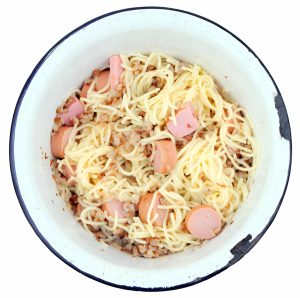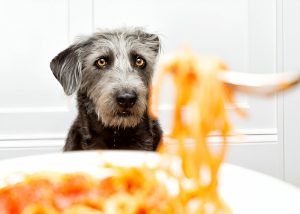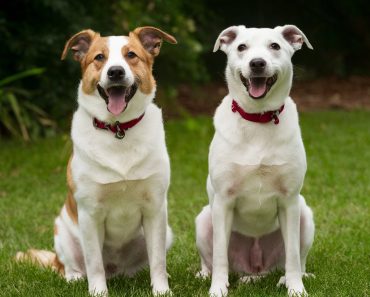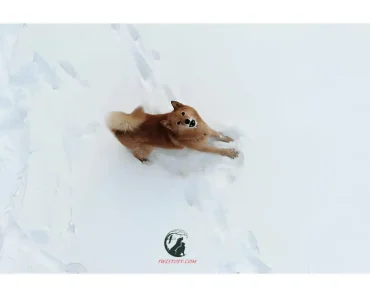Pasta, a staple in many households, has a way of tempting even the most disciplined of eaters. But what about our furry companions? Can dogs partake in this carb-loaded delight without repercussions? The question of whether dog can eat pasta is not a straightforward one, as it involves various factors including the type of pasta, preparation method, and individual canine health considerations. In this comprehensive exploration, we delve into the intricacies of feeding pasta to dog, considering both the risks and potential benefits.

Dogs Eat Pasta
Can Dogs Eat Pasta?
The short answer is yes, dogs eat pasta. Pasta itself is not toxic to dog, and many dog enjoy the taste and texture of cooked pasta. In moderation, plain, cooked pasta can be a safe and occasional treat for your canine companion. However, there are some important considerations to keep in mind before sharing your spaghetti dinner with Fido.
Understanding Canine Nutrition:
Before delving into the specifics of pasta consumption for dog, it’s crucial to understand their nutritional needs. Dog are primarily carnivores, but they are also opportunistic omnivores, meaning they can consume a variety of foods beyond meat. However, their diet should primarily consist of high-quality animal protein, fats, and essential nutrients. Carbohydrates, such as those found in pasta, are not inherently harmful to dogs but should be consumed in moderation.
Types of Pasta and Their Impact:
Pasta comes in various shapes, sizes, and ingredients, each potentially affecting a dog’s health differently. While plain, cooked pasta made from wheat flour, water, and sometimes eggs may seem harmless, other types such as those containing added sauces, spices, or even alternative flours like whole wheat or gluten-free options can pose risks to dog. Ingredients like garlic, onions, or excessive salt commonly found in pasta sauces can be toxic to dog and should be avoided entirely.
Risks Associated with Pasta Consumption:
Feeding pasta to dogs carries several risks that pet owners should be aware of. One of the primary concerns is the potential for digestive upset. Dogs have sensitive digestive systems, and introducing unfamiliar foods or large quantities of carbohydrates can lead to symptoms like diarrhea, vomiting, or bloating. Additionally, certain ingredients commonly found in pasta dishes, such as cheese or cream-based sauces, can cause lactose intolerance issues in some dogs.
Nutritional Value of Pasta
Pasta is primarily made from wheat flour or other grains, water, and sometimes eggs. While it’s not inherently harmful to dogs, pasta is not a nutritionally complete food for them. Dogs have different dietary needs than humans, and their main source of nutrients should come from a balanced diet formulated specifically for their species.
Pasta is high in carbohydrates, which can provide dogs with a quick energy boost. However, too many carbohydrates in their diet can lead to weight gain and other health issues, particularly in overweight or sedentary dogs. Additionally, pasta lacks essential nutrients like protein, vitamins, and minerals that dogs need to thrive.
Impact of Pasta on Canine Health:
While pasta itself does not offer significant nutritional benefits to dogs, it can provide some energy in the form of carbohydrates. However, this energy source is not as efficiently utilized by dogs as protein or fat. Therefore, pasta should not be a staple in a dog’s diet but rather an occasional treat given in small quantities. Feeding excessive amounts of pasta can contribute to weight gain and obesity, leading to a host of health issues including diabetes, joint problems, and decreased life expectancy.

Dogs Eat Pasta
Safe Ways to Feed Pasta to Dogs:
If you decide to share pasta with your furry friend, it’s essential to do so in a safe and responsible manner. Opt for plain, cooked pasta without any added sauces, spices, or seasonings. Ensure that the pasta is thoroughly cooked to avoid any potential digestive issues. It’s also crucial to feed pasta in moderation, as an occasional treat rather than a regular part of their diet. Monitor your dog for any adverse reactions after consumption, and consult your veterinarian if you have any concerns.
Potential Risks
While plain, cooked pasta is generally safe for dogs to eat, there are some risks associated with feeding pasta dishes that contain additional ingredients such as sauces, spices, or toppings. Many pasta sauces contain ingredients like onions, garlic, or tomatoes, which can be toxic to dogs in large quantities.
Onions and garlic, for example, contain compounds that can damage a dog’s red blood cells and lead to a condition called hemolytic anemia. Tomatoes, while not as toxic, can cause digestive upset in some dogs, especially if they consume large amounts or have a sensitivity to nightshade plants.
Additionally, pasta dishes that are high in fat or sodium, such as creamy Alfredo sauce or heavily seasoned pasta salads, can be problematic for dogs. High-fat foods can contribute to pancreatitis, a painful inflammation of the pancreas, while excessive sodium intake can lead to dehydration and other health issues.
Moderation is Key
If you decide to share some pasta with your dog, it’s important to do so in moderation. Treat pasta as an occasional snack or small part of your dog’s overall diet rather than a regular meal replacement. Stick to plain, cooked pasta without any added sauces or seasonings, and avoid giving your dog large portions.
When offering pasta to your dog, be mindful of their individual dietary needs and any preexisting health conditions they may have. Some dogs may have food allergies or sensitivities that could be aggravated by certain ingredients in pasta, so it’s always a good idea to consult with your veterinarian before introducing new foods into your dog’s diet.
Pasta isn’t necessarily harmful to dogs in small amounts, but it’s not a natural part of their diet, and it doesn’t offer much nutritional value to them. Dogs are primarily meat-eaters, and their digestive systems are optimized for processing animal proteins. While pasta itself may not be toxic to dogs, it can cause gastrointestinal upset if consumed in large quantities or if the dog has a sensitive stomach. Additionally, some types of pasta may contain ingredients like garlic or onions, which can be toxic to dogs in larger amounts.
If you’re considering giving your dog pasta, it’s best to keep it plain, cooked, and in small amounts as an occasional treat. Always monitor your dog for any adverse reactions after introducing new foods into their diet, and consult with your veterinarian if you have any concerns about your dog’s diet or digestion.
Alternatives to Pasta for Dogs:
If you’re looking for alternative treats or snacks for your dog, there are plenty of healthy options to consider. Many fruits and vegetables, such as carrots, green beans, and apples, make excellent low-calorie treats for dogs. You can also find commercially available dog treats and chews that are specifically formulated to meet your dog’s nutritional needs.
For dogs with specific dietary requirements or restrictions, there are also specialized dog foods and treats available that cater to a variety of needs, including grain-free, limited ingredient, and hypoallergenic options. These products are designed to provide dogs with the nutrients they need without the potential risks associated with human foods like pasta.
While pasta can be a tasty treat for dog on occasion, there are healthier alternatives

Dogs Eat Pasta
that better suit their nutritional needs. Lean meats like chicken, turkey, or beef provide high-quality protein without the added carbohydrates. Fresh fruits and vegetables such as carrots, green beans, or apples can serve as nutritious and low-calorie snacks. Additionally, there are commercially available dog treats specifically formulated to meet their dietary requirements, providing a safe and convenient option for rewarding your pup.
In conclusion, while dogs can technically eat pasta, it’s not something that should be a regular part of their diet. Feeding pasta to dogs carries risks such as digestive upset, weight gain, and exposure to potentially harmful ingredients. However, in small quantities and when prepared safely, pasta can be an occasional treat for your furry companion. As responsible pet owners, it’s essential to prioritize their health and well-being by providing a balanced diet that meets their nutritional needs. When in doubt, consult your veterinarian for guidance on the best diet for your dog.






